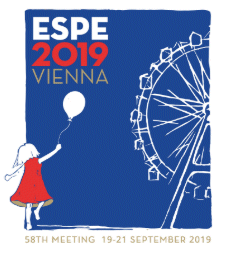
58th Annual ESPE
Vienna,
Austria
19 Sep 2019 - 21 Sep 2019

Poster Category 3
Multisystem Endocrine Disorders
hrp0092p3-179 | Multisystem Endocrine Disorders | ESPE2019
Clinical and Molecular Characteristics of Pediatric Patients with Multiple Endocrine Neoplasia (MEN)
Lee Yena , Oh Arum , Kim Gu-Hwan , Yoo Han-Wook , Choi Jin-Ho
hrp0092p3-180 | Multisystem Endocrine Disorders | ESPE2019
APECED Syndrome in Childhood: Rare Clinical Presentations to Keep in Mind
Arasli Yilmaz Aslihan , Elmaoğullari Selin , Muratoğlu Şahin Nursel , Savaş Erdeve Şenay , Aycan Zehra , Çetinkaya Semra
hrp0092p3-181 | Multisystem Endocrine Disorders | ESPE2019
Phenotype and Clinical Course in Three Individuals with Multiple Endocrine Neoplasia Type 2A due to a RET Gene Mutation
Panou Evangelia , Chrousos George
hrp0092p3-182 | Multisystem Endocrine Disorders | ESPE2019
Two Siblings Case with Diagnosis of Autoimmune Polyglandular Syndrome Type 1
Manyas Hayrullah , Eroğlu Filibeli Berna , Ayranci İlkay , Dündar Bumin Nuri , Çatli Gönül
hrp0092p3-183 | Multisystem Endocrine Disorders | ESPE2019
High Demand for Collaborative Work Between Paediatric Endocrinologists in Arab Countries
Alsaffar Hussain , Elawwa Ahmed , Aljaser Fahed , Chaturvedi Deepti , Ehtisham Sarah , Habeb Abdelhadi , Deeb Asma
hrp0092p3-184 | Multisystem Endocrine Disorders | ESPE2019
Eosinophilic Ascites: A Rare Complication of Autoimmune Polyendocrinopathy
Moudiou Tatiani , Tsikopoulos Georgios , Bisbinas Vasiliki , Giannopoulos Andreas , Karabouta Zacharoula
hrp0092p3-185 | Multisystem Endocrine Disorders | ESPE2019
Final Height and Endocrine Complications in Patients with β-Thalassemia Intermedia: (TI) Our Experience in Non-Transfused Versus Infrequently Transfused Patients and Correlations with Liver Iron Content
TAWFIK SOLIMAN ASHRAF , Yassin Mohamed , Yassin Khadra , Abdulla Mohammad , De Sanctis Vincenzo
hrp0092p3-186 | Multisystem Endocrine Disorders | ESPE2019
Variable Expressivity in Three Generation from a Colombian Family with Multiple Endocrine Neoplasia with Mutation c.482G>A (p.Gly161Asp) in the Gene MEN1 not Described in Colombia
Mejia de Beldjenna Liliana , Diaz Lorena , Vanegas Sara , Perafan Lina , Pachajoa Harry
hrp0092p3-187 | Multisystem Endocrine Disorders | ESPE2019
Difficulties in Hypothyroidism and Diabetes Treatment in Patient with GATA6 Gene Mutation –case Report
Okońska Maja , Brandt Agnieszka , Myśliwiec Małgorzata
hrp0092p3-188 | Multisystem Endocrine Disorders | ESPE2019
Endocrinopathies and Linear Growth in Adolescents with β-Thalassemia Intermedia in Relation to Liver Iron Content
TAWFIK SOLIMAN ASHRAF , Yassin Mohamed , adel ashraf
hrp0092p3-189 | Multisystem Endocrine Disorders | ESPE2019
Bardet-Biedl Syndrome: Not Only what but also how Matters?
Boutalbi Narjess , Selim Nihad , Nait Abdallah Mohamed Said , Bouchair Nadira



